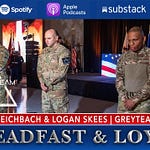Or listen on your favorite podcast platform!
AUTO-GENERATED TRANSCRIPT:
Hey greetings everyone. Lieutenant Colonel Allen West here and welcome to the Steadfast and Loyal Podcast.
[MUSIC]
[ALLEN WEST] Hey greetings everyone. Welcome back to the Steadfast and Loyal Podcast. Elizabeth Fields is the Chief Executive Officer at The Warrior Connection. Elizabeth served as President and Co-Founder of Jackson Fields Consulting, a firm that leveraged 20 plus years of nonprofit leadership experience to help organizations reorganize and scale effectively to ensure sustainable impact. Prior to that, Ms. Fields served as Chief Operating Officer at the Gary Seneese Foundation as well as held various executive roles at leading nonprofits and academic institutions to include National Public Radio, the University of Pennsylvania, the University of Chicago's Booth School of Business, and the University of Arizona where she is a graduate, Eller College of Management. So we are now joined by Elizabeth Fields who is top dog at The Warrior Connection.
[ELIZABETH FIELDS] Well thank you so much for having me on the show today. It's an honor to be here.
[ABW] It's my pleasure. And you just recently moved down here to Texas so welcome to our Texas Heat.
[EF] Well thank you very much. It's a little bit different from that Arizona heat because that's pretty much so dry heat. We have a little humidity we throw in there. Just a little bit. Just a little bit.
[ABW] Well tell us about your background starting out in the not-for-profit world because that can be a world that really has a lot of intricacies and can get bogged down and a lot of not-for-profits do fail. So what are the keys to success for being a nonprofit organization?
[EF] Run it like a business. Run the nonprofit like a business. I don't think what happens a lot of times are a lot of nonprofits, I don't think, a lot of nonprofits are a start-up for because people have a passion. They want to make the passion happen. They want to go run the program. They want to help people. And they just do all that. And they forget that you need to raise awareness. You need to raise money. You need to actually have proper operations because that's what's going to help you grow and become sustainable. So you need to run it like a business and you can't forget about the admin needs that are associated to actually make it grow. Now how often do you see these nonprofits that, you know, they go through maybe some type of ramp-up, some type of train-up as opposed to those that just, you know, "I got a great idea. Like I said, I got a passion. I'm going to apply for a 501(c)(3) status." And then it's like, "Okay, what do I do now?" I'd say that most of them sit there and just go and they forget about everything else. And then it's, "What do I do now?"
The really effective ones will actually sit there and raise capital for a year or two before they even do programming. And then they're set up to actually raise money for, you know, the next year. They don't have to worry about raising money when they're actually trying to run programs at the same time. So now they're establishing a seed money, a base, a foundation. Yes. That is definitely the most effective way to ensure success. Now the branding and of course, you know, the donor contacts. I mean, is there a means by which people can get, you know, good education on doing these things so that it's not, you know, starting from ground zero in many cases?
[ABW] Well, nowadays you can actually go and get a degree in how to run a nonprofit. Wow. That's fairly new. I'm old school. I didn't go and get a degree in that. I learned hands-on and I have to say I still think that's the best way. But being able to, so a lot of times you'll see fundraisers in particular jumping around a lot of nonprofits and people are like, hey, why are they doing that? There's a variety of reasons. But one of them is because you're trying to get different kinds of skill sets that you can then take with you to wherever your final destination is and tweak those processes and procedures that you learned and bring them to that nonprofit and tweak it accordingly. So a lot of times that's why you see that a lot of jump around as well. It's because you're trying to build a tool or skill set, I guess, to take with you. What about board composition? How important is that for a nonprofit organization?
[EF] It's important. You don't want to make it too big because then there's just a lot of different opinions and you can't get any work done. I'd say between 9 and 11 is a perfect amount. You definitely want a combination of people who are tied into the community who can bring a skill set that you might not have available on the board. So for instance, a lot of nonprofits don't like to invest in marketing because it's just a lot of admin costs. So having marketing professionals on the board is a good offset.
[ABW] And then of course you do need some people who are connected and have the ability to give because at the end of the day, if you don't raise awareness and you don't raise any money, you're not going to be offering any program. So you want a nice mixture of skill set, connection, somebody who can actually give money and service to the community. You've got to make sure they're functional. And I used to be on the board of the National Rifle Association and I got to tell you, 76 members. That's a lot. Yeah, I mean you want to talk about inertia. But the interesting thing is that there was a core group that always had the ear of the executive vice president and what have you. And so it was very interesting dynamic to have a board that was that big and to see really that it didn't end up being quite functional. And there was a lot of inability to move forward because like I said, it was that core group. So tell us now, okay, you're in this not-for-profit world and then all of a sudden you get the opportunity to be with some I've met personally on a few times. Mr. Gary Sinise, Lieutenant Dan. Lieutenant Dan. Lieutenant Dan, everyone knows. What was that like to go from being maybe a little bit behind the scenes to now you're the COO of a very large foundation?
[EF] Well, I'm certainly grateful that had that experience, right? Gary's foundation does a lot of work with veterans and first responders. And I was actually originally hired there to be the lead fundraiser. Okay. And then there was a leadership change. The executive director at the time, her daughter had a baby and she said, "I'm retiring and I'm going to move across the country and good for her." Right?
And the board decided to bring in the retired four-star general, Robin Rand, to be the CEO. And he did a little restructure and he actually gave me the honor and appointed me to be the COO.
And I learned a lot, under Gary and General Rand, about operations, about strategy, all those things I talked about beforehand, but at a much higher level.
During COVID actually, there was a lot of specialty campaigns going on too. So there was a lot more external work that I got to experience that I wasn't expecting as the COO. So it really actually set me up for success to go into this next level, like the CEO position at the Warrior Connection.
[ABW] Now, what were some of the key takeaways as you come over to the Warrior Connection? What were some of the things, great lessons learned from being with the Gary Sinise Foundation that enable you now to transition? And like I said, now you're the top dog with the Warrior Foundation here. Yeah, I'd say one of the key-- Warrior Connection, I'm sorry. Well, that's okay. One of the key takeaways is definitely finding what makes you unique and stands out in this particular space that you are in. So there is a uniqueness at the Warrior Connection.
[EF] I mean, if I may, just go right there. Yeah, yeah, we want to. Okay, at the Warrior Connection, there's two things that actually really make us unique. And the very first one is while we're trying to prevent veteran suicide, we are one of three organizations in the entire country that serve, offer specialty programming for servicemen and women that experience military sexual trauma during their service. We're one of three. The second thing is that we've had unparalleled success. And as you know, I've been in the nonprofit world for 26 years. And I've never seen anything like I've seen at the Warrior Connection's impact. We are trying to prevent veteran suicide. We've offered 13 years of programming, and we've yet to lose one veteran to suicide after going through one of our programs. So you need to find what makes you unique. You do. And let the community understand, like, the impact you're having to the community and that this impact needs to continue. Yeah, because the thing is, because I'll be very honest, because of the shortfalls and failures, I think, of the VA system, we have so many of these, you know, veterans organizations that are out there to step in and fill that gap. But it's becoming flooded without a doubt. And of course, when you flip on the TV, you're going to see the Wounded Warrior Foundation and all of the many others that are out there to include some of these scam artists that are, you know, capitalizing on Camp Lejeune and the water that's there. And so it's critical that you do find that niche, that thing that separates you out. Talk to us about, you know, this program about the sexual trauma, the victims of sexual assault, because that's something you don't hear about with many of these other programs. You hear about, you know, losing limbs and things of this nature. But you don't hear about that invisible trauma that especially affects our female troops. And I'm sure some male troops as well. And actually, it's interesting that you talk about the male perspective, because as a, for men, right, it's hard to raise your hand and say, I need some help. Oh, God, yeah. It gets even harder when there's been military sexual trauma added on. A lot of times when we offer a retreat, it's going to be specific for post-traumatic stress, because that's what the men are feeling, much more comfortable going to a PTS retreat. And then a lot of times the MST comes out from that retreat because they're in a safe space. And MST is military sexual trauma? Correct. Military sexual trauma. And we definitely have a four to one demand, though, for women to come through one of our programs. And there's 600 veterans on our wait list. Wow. Yeah, 600. We've served over a thousand to date, but every single day, we don't have a director of programs right now. And so I'm the one getting the inquiries, and it's nonstop every day. Are you looking for a director of programs? We are. We actually identified somebody. Okay. Sorry, I was trying to get a finder's fee out there, but no. He's onboarded a few hours a month. Okay. And then hopefully we'll get him on full-time soon. We definitely need him. And he is a combat veteran, so I'm excited to announce who he is, hopefully shortly. Wonderful.
But it's definitely a problem, but we're here to be part of that healing journey. And like I said, we're one of three organizations, so the demand is there. Yeah. The product's there, and we have a very successful, impactful product, for sure. Now, let's talk about the scope. You're based here in the Texas, the North Texas area. Where are many of your programs conducted, your retreats and things of this nature, and how well is your reach across the country? So we operate our program out of Graham, Texas. We're very grateful to have a relationship with another nonprofit called the Young County Warrior Ranch, and they let us use their ranch for free. We do need a large space to do it.
And we originally were founded in Vermont and moved here a couple years ago. And we serve veterans and actual spouses. We do retreats for spouses as well across the country.
Eventually, what we'd like to do is keep serving veterans nationwide. We're never going to stop that. But eventually, we'd also really like to make sure that we're really servicing our community as well, since Texas is our home. And Texas only retreats at some point, too. So make it a combination. Ideally, we'd be doing retreats twice a month, but you need to build some financial capital to have that happen. So we're not quite there, but we're going to get there. Now, when you talk about retreats, give us an idea about what a retreat program looks like, you know, the length, what the focus is. Yeah. So we run them from a Saturday to a Saturday. OK. And then it's they're holistic. They're not traditional clinical behavioral. So it's a combination of daily yoga, expressive arts is a critical part of it, peer to peer group discussions, reflection time. There is some spirituality, nature activities. This is the reason why we want the ranch. Yes.
They're small. And we keep them small on purpose. There's only eight veterans that go through at a time. Right. It's very different if we had 500 veterans at a hotel convention center. Nobody's going to open up. No. So by bearing eight veterans together, we usually have a mentor, a facilitator in training and then two facilitators that run the retreats. And this is this is interesting. Our facilitators are all volunteers. And there's always one veteran facilitator appeared with a civilian facilitator. And the veteran facilitator has most likely gone through the program. Good. And they go through that mentor ship and then the facilitator in training. And when they feel like they're ready to step up to that level, then they will actually facilitate a program. And we have a few that are that have been with the program the entire time.
[ABW] Now, how can people get engaged and get involved in supporting you? And what's the cost for bringing eight veterans down for one of your your training programs? So they can go to WarriorConnection.org. That's the best way to learn about how to support our program, how to get involved with the program, how a veteran can sign up and unfortunately go on the wait list at this moment. The program.
[EF] I'm actually lost my train of thought. Sorry. I forgot the question.
[ABW] Well, what we're talking about is, you know, the cost because we want to make sure how can people support you because, you know, you're talking about Saturday to Saturday and you're talking about airline travel or some type of travel down to Graham, Texas. And of course, the lodging, the meals and all of these type of things. So what's that cost for one person to be able to go through one of your retreat programs?
[EF] So the average cost is twenty five hundred dollars. And it also depends. Right. The airline ticket is the most expensive. Hands down. When we have offsetting costs, it obviously brings the average down. So, for instance, the last couple of retreats, H.E.B. stepped up and provided all the food, the Graham and Lions Club and Rotary Club. They provided all the transportation for these last two treats. So it wasn't twenty five hundred dollars. But on average, it's twenty five hundred dollars to put one veteran through the program. It is one hundred percent covered for every veteran and every facilitator. So there was no out of pocket expenses to them. Now, can someone just say, you know, I want to volunteer to be behind the scenes, you know, help you with making phone calls, coordinate, whatever, sweep the facility. You know, how can people do that and step into that gap? They definitely can.
One of the most common ways is to bring meals. So a lot of people like to cook or come to the property and cook and have a meal with the veterans and the participants.
So that's a great offsetting cost for us. Yes. So we always encourage that. One of the most critical parts of the healing journey is the very last day. So that Friday afternoon is inviting the community to come in and meet with the participants. They have an opportunity to share their stories as much as they want and their experience. And the community shares their gratitude. And it's a really important bonding moment for the individuals that are going through the retreat. Quite frankly, it's exceptionally impactful for the community to have this interaction with these veterans and these heroes.
And the only thing I ask and the only thing that's needed is if your listeners want to come to a retreat graduation to please, you know, contact us at info at WarriorConnection.org so we can be prepared to host them at the property. That'd be great.
[ABW] So as we get ready to wrap up this interview, you talk about scale. So where you are right now, where do you see the Warrior Connection being three to five years from now?
[EF] Well, we try to do seven to nine retreats a year. Oh, seven to nine retreats. I thought you meant years. But seven to nine retreats. Yeah, seven to nine retreats a year. We'd like to be running a retreat monthly for sure, if not twice a month. At some point, it would also be great to be partnering with additional nonprofits in other parts of the country so we could actually be operating multiple retreats in multiple locations and helping more veterans.
[ABW] And hiring the staff to do that, is that going to be a challenge or?
[EF] I suspect so. I suspect so. We're not quite there yet. You know, we want to scale here and make sure that we're doing monthly retreats here in Texas first. Super. But we do have actually other nonprofits that are interested in partnering with us. But let's make sure that we get sustainable here in Texas and then we'll get there. You do the blocking and tackling here and then you can worry about the fancy plays later.
[ABW] Right. Absolutely great. OK, again, how can people get in contact with you to help support you to volunteer to bring meals, things of this nature, the Warrior Connection?
[EF] The best way is to go to WarriorConnection.org, but they can contact me at info at WarriorConnection.org. That mailbox comes to me. And quite frankly, you can give me a call. 940-315-4777 is my cell. And I'm happy to take calls and emails and to visit our website, WarriorConnection.org, to learn more and to help us out. And for you veterans out there that are dealing with the MST, the military sexual trauma, please seek out the Warrior Connection to get the help, because again, this is a very unique trauma that is out there that you've got to fight through it and you've got to admit that you do have a problem. Male or female, you've got to say that I need the help and the Warrior Connection is there to help you.
[ABW] Any parting words, thoughts or anything else you want to get out about the Warrior Connection, Elizabeth?
[EF] I want to thank our veterans and their families for the service. We obviously wouldn't be here if you hadn't offended our democracy and our freedom and our way of life. So thank you so much. We are here to help you. So feel free to reach out. We want to help. And thank you again for hosting us today.
[ABW] My pleasure. Thank you, Elizabeth. Thanks. God bless. Ladies and gentlemen, thank you for joining us on this episode of the Steadfast and Loyal Podcast. Special thanks to Elizabeth Fields for being with us and discussing the Warrior Connection and what they are doing to help the lives of our veterans who are still struggling with an unseen enemy. And if you like this podcast, please click the like button and share it with others. And until next time, Steadfast and Loyal.















Share this post